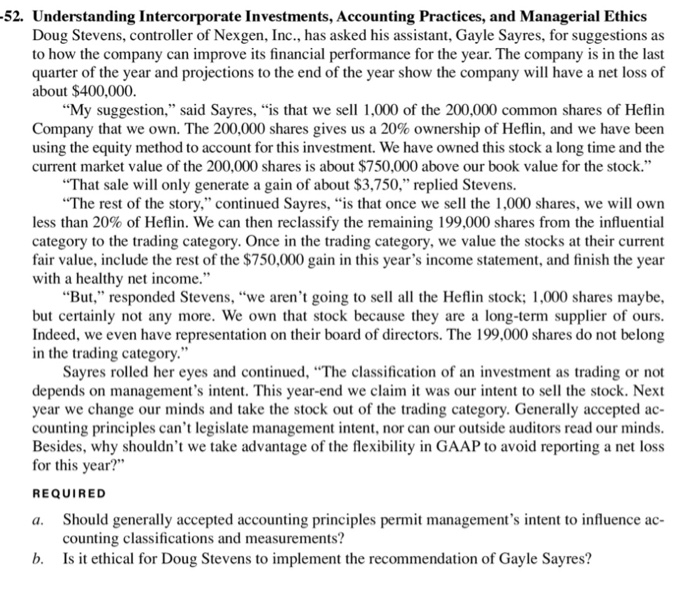-52. Understanding Intercorporate Investments, Accounting Practices, and Managerial Ethics Doug Stevens, controller of Nexgen, Inc., has asked his assistant, Gayle Sayres, for suggestions as to how the company can improve its financial performance for the year. The company is in the last quarter of the year and projections to the end of the year show the company will have a net loss of about $400,000. "My suggestion, said Sayres, is that we sell 1,000 of the 200,000 common shares of Heflin Company that we own. The 200,000 shares gives us a 20% ownership of Heflin, and we have been using the equity method to account for this investment. We have owned this stock a long time and the current market value of the 200,000 shares is about $750,000 above our book value for the stock." "That sale will only generate a gain of about $3,750," replied Stevens. "The rest of the story," continued Sayres, is that once we sell the 1,000 shares, we will own less than 20% of Heflin. We can then reclassify the remaining 199,000 shares from the influential category to the trading category. Once in the trading category, we value the stocks at their current fair value, include the rest of the $750,000 gain in this year's income statement, and finish the year with a healthy net income." "But," responded Stevens, "we aren't going to sell all the Heflin stock; 1,000 shares maybe, but certainly not any more. We own that stock because they are a long-term supplier of ours. Indeed, we even have representation on their board of directors. The 199,000 shares do not belong in the trading category." Sayres rolled her eyes and continued, "The classification of an investment as trading or not depends on management's intent. This year-end we claim it was our intent to sell the stock. Next year we change our minds and take the stock out of the trading category. Generally accepted ac- counting principles can't legislate management intent, nor can our outside auditors read our minds. Besides, why shouldn't we take advantage of the flexibility in GAAP to avoid reporting a net loss for this year?" REQUIRED a. Should generally accepted accounting principles permit management's intent to influence ac- counting classifications and measurements? b. Is it ethical for Doug Stevens to implement the recommendation of Gayle Sayres







